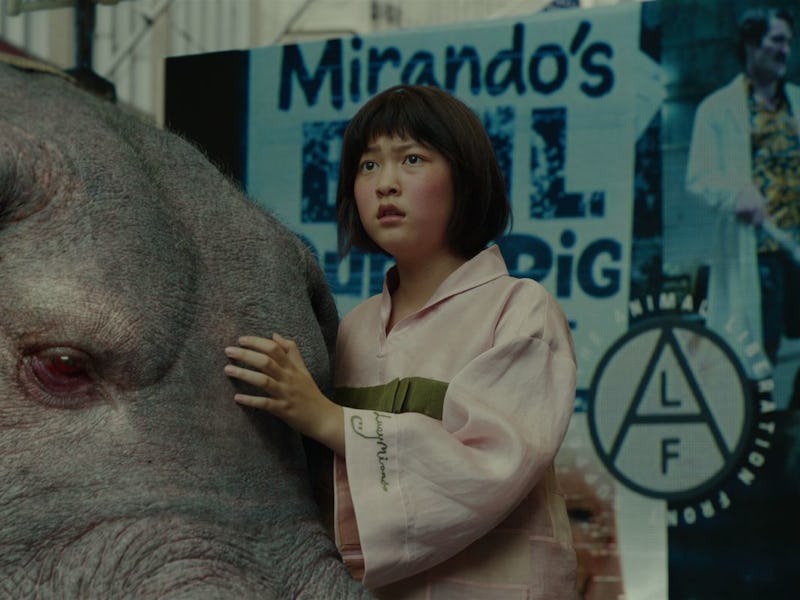The Ending of Netflix's 'Okja' Makes It a Horror Movie
Unabashed capitalism is scarier than any masked murderer

The new Netflix movie Okja feels like an impossible mashup, as if Hayao Mayazaki, John Carpenter, and a contemporary comedy director like Paul Feig all teamed up to make a film without sublimating their personal styles — and somehow, manage to make something that’s even more than the sum of its parts.
But director Bong Joon-ho (Snowpiercer) is the single mastermind behind the equal parts cutesy and cutting intercontinental heist comedy. After an intro at a corporate presentation in America, it begins in earnest like a live action version of Miyazaki’s gentlest movies, with a young South Korean girl named Mija (Seo-Hyun Ahn) frolicking through the deep mountain woods with a gigantic super-pig named Okja. But the pig actually belongs to a massive food conglomerate called Mirando, which sent a handful of genetically altered pigs out to people around the world as part of a long-term promotional project a decade prior.
Now that they’re fully grown, Mirando recalls the super-pigs back to New York, where they can be presented in a big celebration that will complete the mega-corporation’s rebranding. The project was concocted by loopy CEO Lucy Mirando (Tilda Swinton), who wrestled the family-owned company from her craven twin sister Nancy (also Tilda Swinton). The animals will later be sent to the slaughterhouse, but their humane treatment is meant to make people feel better about eating such cuties; future super-pigs won’t be free range, but no one knows about that.
A doofy group of radical environmentalists is privy to the ruse, and they intercept Okja mid-journey as part of a plot to expose Mirando. The plan is successful, but it leads Nancy to take back control of the company. She’s vengeful and ruthless, which makes for a tail-end of a third act that turns this farce into a positively terrifying reflection of the real world.
Spoiler alert (as if clicking on a story with this title wasn’t just asking to be spoiled): Mija and Okja are reunited at the end of the movie. And they do live happily ever after, but just how they get to that point is absolutely chilling.
At the final climax of the film, Mija races to save her giant pig BFF from the execution line. The big guy is moments away from being slaughtered, and Nancy is actually excited to see him become a pile of GMO steaks — his death will be a symbolic exclamation point on her return to power. Then, Mija makes her an offer out of desperation: A solid gold pig given to her by the sweet grandfather who raised her, in exchange for Okja’s life.
After Nancy examines the precious pig totem, she takes the deal — the gold is far more valuable than one living creature’s life.
Tilda Swinton evaluates the proposed deal in 'Okja'
Once Nancy deposes of Lucy, she does away with the facade of kindness and responsibility that so many corporations adopt today; all those banks and processed food companies flying flags for Pride and acting pro-refugee still foreclose on houses, poison people, and exploit poor labor. Corporations, when stripped of all the public relations, really just want the gold pig. And now after the debacle, with Nancy in charge, Mirando will likely be even more powerful.
Bong has spent a lot of time during his promotional tour talking about capitalism, and its tendency to create and then reward the most ruthless, exploitative operators. “All our problems arise because of capitalism,” he declared to The Guardian. “It brings pleasure but also so much pain and unhappiness. The questions I ask in my films [are] about why we harm the environment or animals all come down in the end to capitalism.”
The ending isn’t so much a question, but a display of Bong’s great assertive genius: He gives viewers the sweet ending that they want, but makes them swallow some real bitter medicine. So yeah, Mija gets to go home with Okja and live in the peaceful mountains in which they were raised — but the world beyond that idyllic Miyazaki paradise is a dark, nightmarish dystopia in which lives are only as valuable as the miniature gold statuettes for which they can be exchanged.